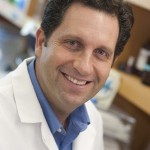Darrell Kotton Receives Alpha-1 Project Support to Expand iPSC Development

The Alpha-1 Project (TAP) announced a $150,000 commission to Darrell Kotton, MD, to expand development of induced pluripotent stem cell (iPSC) lines created from tissue donated by patients with Alpha-1 Antitrypsin Deficiency (Alpha-1). Kotton is Professor of Medicine and Co-director of both The Alpha-1 Center and the Center for Regenerative Medicine at Boston University School of Medicine and Boston Medical Center.
“We are happy to announce The Alpha-1 Project’s investment in providing tools for researchers and industry,” said Jean-Marc Quach, Executive Director of TAP. “This commission signals our intent to direct research and resources aimed at speeding the development of new therapies for Alpha-1. I must emphasize that additional funds will need to be raised from the community if Dr. Kotton is to meet the goal of completing 20 stem cell lines over the next three years.”
Kotton plans to make the Alpha-1 iPSC lines available to all researchers interested in studying stem cell technology and possible therapies for Alpha-1.
“We’re excited to expand our research resource portfolio for the international investigator community with the leading-edge technology of these cell lines,” said John Walsh, President and CEO of the Alpha-1 Foundation and member of TAP’s board of directors. “Dr. Kotton is a leader in Alpha-1 research and in sharing his findings with other researchers. He has created a best-in-class Clinical Resource Center and set an example of embracing our community by his participation in conferences and inviting Alphas to tour his lab, meet his colleagues, and participate in his clinical research. We’re committed to raising the additional funds to promote access to this incredible resource.”
The development of the stem cells is exciting in part because, unlike embryonic stem cells, they are created from cells donated by living adults with Alpha-1. Since iPSC cells are undifferentiated, they can be induced to grow into various organ cells.
Kotton is well known for championing “open source” biology, sharing his findings, cells, reagents, and ideas with other researchers. In 2012, he and Jayaraj Rajagopal, MD, at Massachusetts General Hospital and Harvard Stem Cell Institute, announced that their teams had collaborated to develop new ways to turn stem cells into different types of lung tissue, surmounting a major hurdle in trying to harness the power of stem cell biology to study and develop treatments for major lung diseases.
“We are grateful to The Alpha-1 Project for its support, and we hope that the Alpha-1 iPSC bank will serve as an international resource for all those dedicated to advancing Alpha-1 research,” said Kotton. “Each cell line represents an essentially inexhaustible source of tissues derived from a tiny donated blood or skin sample from 20 individuals with Alpha-1. These cells can be shipped to any investigator interested in modeling Alpha-1 liver and lung disease in their own laboratories. We hope that this type of community-wide effort will one day accomplish our shared mission of finding better treatments for this inherited disease.”
Kotton currently has three cell lines developed from patients, which he freely shares with the global academic research community. The 20 additional cell lines will represent many different Alpha-1 phenotypes and genotypes.
Kotton, together with his Boston University colleague, Andrew Wilson, MD, in 2011 founded The Alpha-1 Center, focused on complete care of patients with Alpha-1. The two colleagues also direct joint basic science laboratories with a history of advancing Alpha-1 related research.
The Alpha-1 specialists at BU’s Alpha-1 Center are among more than 70 Alpha-1 Foundation Clinical Resource Centers across North America.
About The Alpha-1 Project
Mission statement: The Alpha-1 Project will work with patients, academia, pharmaceutical and biotech companies, and public health organizations in the relentless pursuit of cures and therapies for COPD and liver disease caused by Alpha-1 Antitrypsin Deficiency. For more information, visit www.thealpha-1project.com. The Alpha-1 Project is a wholly-owned for-profit subsidiary of the Alpha-1 Foundation. For more information on the Foundation, visit www.alpha-1foundation.org.